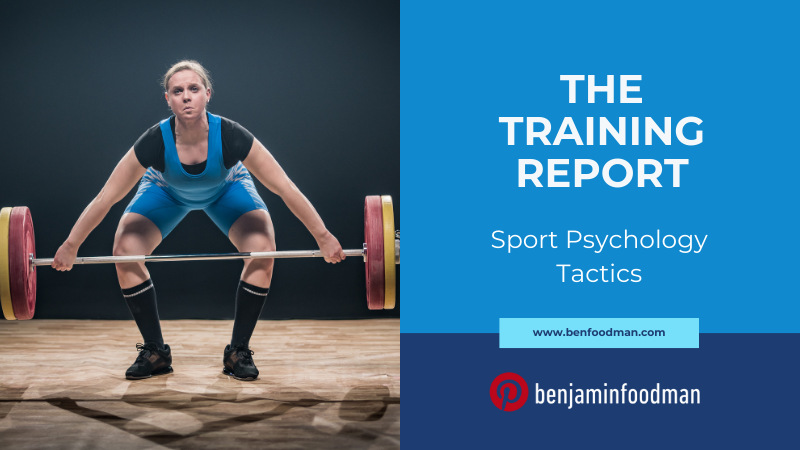Sport Psychology Tactics - The Science Of Mental Toughness & Racecar Drivers
About the Author
Ben Foodman is a licensed psychotherapist & performance specialist. He owns his private practice located in Charlotte North Carolina where he specializes in working with athletes to help them overcome mental blocks (the yips), PTSD, ADD / ADHD and achieve flow states through the techniques of Brainspotting & Neurofeedback. If you are interested in services, use the link here! Enjoy the article below!
Introduction: Mental Skills Training, Mental Toughness & Auto Racers
“It’s an initial shock to your system when the car won’t react to your inputs, but I was never afraid. On the contrary - I often though most clearly when I was close to having a big accident. It means not panicking, not being paralyzed. A driver must have an instinct for these moments to react instinctively with wisdom and perspective”
Motorsports is one of the most physically and mentally demanding forms of competitions that humans participate in. Athletes competing in these events are required to process high volumes of information at rates of speed that fall outside of our normal processing abilities all while having to compartmentalize the additional risks that are associated with these types of sports. Specifically, racecar drivers have incredibly stressful jobs that are taxing on both the body and the mind. If these athletes want to both stay competitive and give their employers good reasons for keeping them in the cockpit, they need to utilize all resources available to make these things happen. One resource racecar drivers have begun to utilize is sport psychology.
Racecar drivers competing in NASCAR, IMSA, WRC, WEC, Grand Prix and other racing series are all competing against elite drivers, and because of this, they need to have mental toughness to overcome this level of pressure. One of the ways they have done this, is to focus on developing their mind to become more mentally tough. Interestingly, many of these drivers and teams are turning to new, and unconventional forms of sport psychology that are focused on utilizing neuroscience-based approaches rather than what is referred to as ‘top-down’ sport psychology interventions in order to develop mental toughness. For this issue of the Training Report I want to review what some of these new interventions are and how they help drivers develop this important skill in motor sports.
Part I. Exercise Psychology For Racecar Drivers
Traditional sport psychologists use exercise psychology strategies to help people lose weight and stay motivated through a health crises. However, in my practice and in some of the more elite sports performance facilities, we are beginning to use exercise psychology tactics to enhance mental training outcomes. For example, one form of strength & conditioning training that actually has a exercise psychology-based application is Prehab. There are many different definitions and interpretations of what ‘prehab’ is. In the book The 4-Hour Body by Timothy Ferris the author quite simply defines prehab as ‘injury-proofing- the body. You could make the argument that all strength & conditioning is ‘injury-proofing’ the body, but when speaking with different exercise science professionals and physiotherapists, most of these individuals consider prehab to be a combination of strength training with physical-therapy style focused exercises. In Mr. Ferris’s book, he provides an example of how prehab specialists think about this issue: According to Gray the most likely cause of injury is neither weakness nor tightness, but imbalance. Think doing crunches or isolated ab work is enough to work your core muscles? Think again. ‘The core, as just one example, often works fine as long as one’s hips aren’t moving. It’s when the hips are moving-a more realistic scenario-that the core starts to compensate for left-right differences.’ That’s when you get injured. Other experts in the field provide similar content to support the need to focus on Prehab interventions.
In the book Becoming A Supple Leopard by Dr. Kelly Starrett, the following excerpt provides additional rational for this type of thinking: Prioritizing spinal mechanics is the first and most important step in rebuilding and ingraining functional motor patterns, optimizing movement efficiency, maximizing force production, and avoiding injury. In order to safely and effectively transmit force through your core and into your extremities, you need to organize your spine in a neutral position and then crease stability throughout that organized system by engaging the musculature of your trunk, which is knowns as bracing. This is the basis of midline stabilization and organization. To oversimplify this, if you are a professional racecar driver and your body is in pain, or aching, your mental focus will be compromised, and you will have a lot of disappointing performances. So, what exactly does Prehab have to do from an exercise psychology and mental toughness perspective? Certified Strength & Conditioning Specialists and exercise physiologists follow the principle that all athletes should train using sport-specific movements. When we think about the physical demands of racecar drivers (and all motorsport athletes), prehab would be an ideal training methodology because the body will inevitably suffer from compression forces in the car, creating bilateral and unilateral deficiencies.
However, I believe it is important to consider the psychological component of these driving stressors, because when race car drivers enter the cockpit, they will need to have their mind focused on staying on the race line, processing course demands to achieve peak performance outcomes and not being distracted by unwanted pain that is experienced in the body. Other forms of exercise psychology include utilizing heat training, road biking, neck strength training, etc. But for example, if we focus on racecar drivers that incorporate heat training, not only will this help their body become heat-adapted to the car, but they will also have to develop new levels of mental toughness to be stay in those types of environments. Drivers that do not regularly engage in this form of training will experience situations where their cool shirt fails and will complain to their team/crew chief about the issue…but this is ill-advised. As a professional athlete, you are expected to conduct yourself as a professional and if these forms of training have been neglected then the athlete will put themselves socially and professionally in an adverse situation. There is a difference between raising concerns and complaining, and what I always remind drivers is that there are hundreds of up-and-coming athletes ready to take their seat that would gladly not complain about the pain in their body or the heat conditions. Drivers should not put themselves in a position where they ever need to raise those concerns.
Part II. How Sport Psychologists Use Energy Management For Racecar Driver Psychology
Having a successful race usually comes down to a math problem. Do you have enough fuel, tires, and other resources to get the car to be both faster than the other cars and remain durable enough to cross the finish line. But there is just one problem…we also have to be able to get the driver to do many of the same things as the car in that time period. The driver has to be able to process information faster than his/her counterparts and for longer periods of time. Being able to do this comes down to energy that is available versus energy that is not available. Logically, the more energy you have available than the more successful you will be at doing these things. Let’s consider what it takes to compete at an endurance racing event such as 24 hours of Le Mans. During an average NASCAR race, drivers are burning anywhere from 2000 up to 6500 calories per race. These individual races can last up to 2 hours. In the 24 hours of Le Mans, you may have anywhere from 4 to 8 stints in the cockpit for up to 2 hours per stint, assuming everything goes well. You will be burning through significantly more calories than in a NASCAR race, and you will be trying to perform under the awful conditions of sleep deprivation. So how can motorsport athletes adequately prepare for these energy demands from a mental toughness standpoint?
Based on my experience, the best performers are ruthlessly efficient at where they put their energy through the weeks leading up to the race, and just as importantly where they choose not to put their energy. For instance, the top racecar drivers I have worked with carefully filter through their social connections that help them advance in their sport, while quickly cutting out the connections that do not match their goals. Negative friendships, romantic relationships where the partner is not equally invested in driver’s career goals, or anyone that is not ‘a part of their team’ is quickly removed from their orbit. This is because they recognize that if those social connections require excessive maintenance, that is energy that is lost prior to the race which means that they will be that much less effective as a performer. Other examples include making smart decisions about training, no use of social media during races, committing to sleep performance, etc. Furthermore, there is plenty of research that supports the concept of how emotional and psychological energy actually extracts from glucose in the body during complex cognitive tasks. A racecar driver’s brain is already having to work at intense levels during a race (which most likely encompasses the majority of the calorie burn during the race), which makes it tough to justify expending that energy on things that don’t help you win races (e.g. trying to make people happy in your social circles that are not truly invested in your success, scrolling through social media). If the driver is having to cater to someone or something that is not equally invested in their performance goals, then that driver will almost certainly be less successful and will probably fail in whatever racing series they are a part of.
Part III. The Science Behind Race Car Driver Mental Flow States
Flow has been defined as ‘a state of full task absorption, accompanied with a strong drive and low levels of self-referential thinking’. Oftentimes athletes that have experienced flow states describe an ‘out of body experience’ or effortlessly performing complex sport movements with peak outcomes. It is understandable that many athletes and sport psychologists would go to great lengths to find interventions that could potentially help facilitate the regular creation of flow states. This is where neurofeedback comes into play. As previously mentioned neurofeedback attempts to train ideal brainwaves, and research suggests that different brainwaves are associated with different mental states (e.g. speedier brainwaves are used for thinking while the slower brain waves are used for relaxation and maintaining involuntary bodily functions). Therefore, many sport psychologists and neurofeedback professionals suspect that there are specific brainwaves that correlate to flow states AND can be trained with this intervention. So what are the specific brainwaves that could possibly be associated with flow states?
First, it is important to note that the average human brain is composed of 86 to 100 billion neurons, and between those 86 to 100 billion neurons we have approximately 2 to 4 quadrillion synaptic connections. I say this to inject some humility into this conversation with the understanding that there is alot we do not know about our own brains, and most research in ALL of psychology still operates on theory. With that being said, Neurofeedback researchers have suggested several possibilities to consider. Data from QEEGs seem to demonstrate that lower Alpha power and increased Theta power are possible contributors to flow states (it has been suggested that Alpha waves induce feelings of calm, increase creativity, and enhance your ability to absorb new information while Theta waves indicate a very relaxed brain state and are also common during meditative periods or at times when individuals are in a deeply creative or insightful state of mind). However, there are other important considerations when trying to understand flow from a neurofeedback perspective. For instance, flow states could be better understood through larger scale brain networks (large scale brain networks have been defined as collections of widespread brain regions showing functional connectivity, which means that cognitive tasks are performed not by individual brain regions working in isolation but by networks consisting of several discrete brain regions that are said to be functionally connected).
In the research article titled Go With The Flow: A Neuroscientific View On Being Fully Engaged by Linden, Tops & Bakker, the authors suggest that the large-scale networks of the Default Mode Network, the Central Executive Network & the Salience Network may play a critical role in the generation of flow states, and that sport psychologists specializing in neurofeedback should take care in understanding these concepts when applying neurofeedback training to athletes. So, what should athletes take away from all of this information in regard to the connection between flow states and mental toughness? In my opinion, neurofeedback training will allow the biological functioning of the driver’s brain to operate in a smoother state, which in turn will remove unwanted and involuntary distractions, thereby increasing the driver’s ability to focus, and maintain the emotional mental state that is needed to stay competitive in this race. If an athlete is able to stay focused for longer periods of time, than the easier it will be for that athlete to be ‘mentally tough’. In other words, I think athletes should train in this manner as a form of working ‘smarter’ not harder. If your brain is not creating problems for you, then it becomes that much easier to be ‘mentally tough’.
Note To Reader:
If you are an athlete reading this segment of the TRAINING REPORT, hopefully this content was helpful! I put the Training Report together because I felt like many of the discussions on issues such as the Yips/mental blocks, strength training & other subject matter on athlete performance concepts were really missing the mark on these ideas (e.g. how trauma is the direct cause of the Yips). If you are interested in learning more, make sure to subscribe below for when I put out new content on issues related to sport psychology & athlete performance! Also, if you are looking to work with a mental performance specialist, you are in the right place! USE THIS LINK to reach out to me to see if my services are the right fit for your goals!
ARE YOU ON THE LIST?
Make sure you’re signed up to Ben’s mailing list to receive news & updates on new strategies in sport psychology, upcoming workshops & products. Don’t wait, sign up now!

















































































